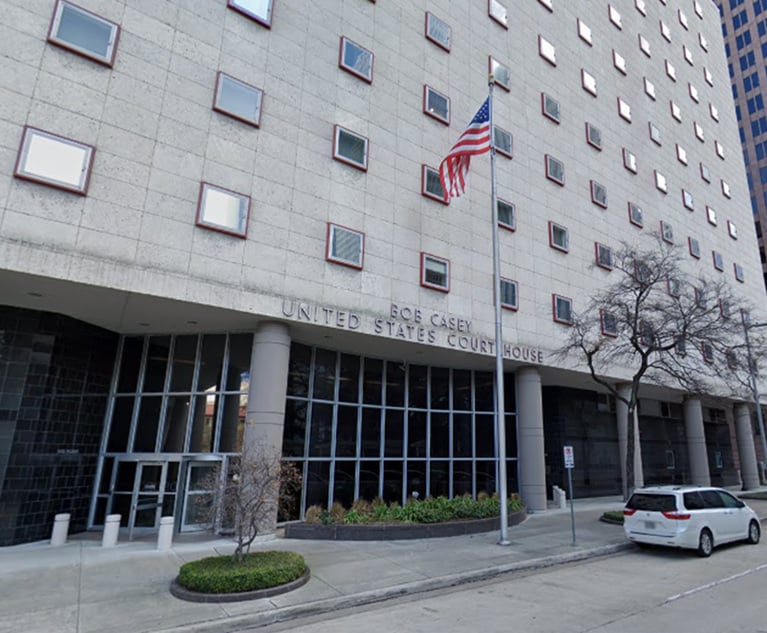Satisfied Attorneys Are the Overlooked Key to Revenue Growth
As law firms start another year with aggressive goals, isn't it self-limiting to only look at their clients' satisfaction and ignore the attorneys who are responsible for it?
January 30, 2019 at 02:30 PM
7 minute read

Most law firms spend significant money and resources on satisfaction programs, knowing that happy clients usually generate more work and higher revenue. But are firms only looking at one side of this two-sided equation? What about attorney satisfaction? If the people responsible for delivering a great client experience are dissatisfied with their work or firm, can they still exceed clients' expectations and deliver superior service?
There are many national studies available highlighting the level of lawyer dissatisfaction. In fact, in 2013, CareerBliss, an online career company, surveyed 65,000 people and the No. 1 unhappiest job in the U.S. was an associate attorney. The reasons for this disengagement are varied—the encroachment of technology and alternative legal providers, an overall commoditization of the industry, and firm politics and policies, among others. “This isn't what I signed up for” is a common refrain from many attorneys.
In 2015, I returned to the legal industry after spending nearly five years in the corporate world with ManpowerGroup, a global staffing company. One of the biggest differences I observed between corporate and legal is that corporations understand the correlation between client satisfaction and employee satisfaction and are vigilant about managing and measuring both.
When I first joined ManpowerGroup, satisfaction measurement was bifurcated; marketing used one vendor and approach to measure client satisfaction and human resources used a different tool and vendor to measure employee engagement. For the first two years, there was rigorous effort with each program, but they were completely disconnected. The two were connected after I joined the Bain Loyalty Forum, a group of industry leaders focused on the client experience, led by Fred Reichheld, a Bain fellow, Harvard professor and co-creator of Net Promoter Score. He insisted that the key to winning customers and clients was ensuring that the employees delivering the service were engaged and passionate. He also said that as the talent market gets tighter and tighter, organizations that invest in their employees as much as their customers and clients will win.
I began attending forum meetings and sat beside representatives of companies focused on the total satisfaction experience, such as Apple. Their view of the symbiotic relationship that exists between customers and employees inspired me, and I came back, met with my COO, and proposed that we align and combine our satisfaction efforts and tools. We were impressed and humbled by the data, which showed clear trends. In the regions where we had the highest client satisfaction, we also had the highest employee engagement scores. Not surprisingly, regions that were underperforming had lower employee engagement scores. At future forum meetings, corporate members shared their best practices to calibrate internal with external, knowing the strong interdependence.
Employee and attorney engagement rarely come up in conversations with my peers or at legal conferences. It's as if there's a perception in the field of law that measurement of our lawyers' satisfaction is too personal or unnecessary. In the corporate world, ensuring you have an engaged team is a priority, and one of your primary key performance indicators. For example, ManpowerGroup consistently measured employee engagement and evaluated all vice presidents, including me, based on our team's engagement. Employees anonymously completed surveys, with the results of every department and business unit transparent throughout the organization. The survey was comprehensive and able to pinpoint issues like whether an employee respected the company but not their department. As leaders, our bonuses depended on having engaged teams. If we had low engagement scores, we needed to have a remediation plan and measurable improvements, or we faced termination.
Other Fortune 500 companies have similar rigor, which may raise questions of in-house counsel. If they are managing and measuring internal satisfaction, why aren't their law firms?
I have worked in the legal industry long enough to predict the objection many firms will have to the above system. “We're a partnership,” they will say. “Those programs may work in a corporation, but not in a law firm.” I respectfully challenge firms to consider the risk. Timekeepers are a firm's most valuable asset, and depending on the study, 20 to 60 percent of them may be disengaged. Of course, it's possible that unhappy lawyers can mask their displeasure and keep clients unaware. But while some attorneys can compartmentalize their frustrations, others are not so adept.
To get an insider perspective, I called Tara Weintritt, co-founder of Wicker Park Group, who spends her days conducting one-on-one client satisfaction interviews for Am Law 200 firms. She said she and her colleagues are seeing a rise in client complaints about lawyer negativity. During her hour-long interviews, feedback typically centers on traditional topics, such as collaboration, billing and knowing the client's business.
“Clients we interview also say how important it is to have lawyers who love what they do and are passionate about their work, and not wallowing in negativity about their frustration with fellow partners or firm dynamics,” Weintritt said.
But she and her partners began hearing more frustration from clients about attorneys airing dirty laundry, so they started collecting verbatim quotes to examine patterns. Following are two quotes from actual clients about their law firms, which are unattributed to protect privacy:
“There are clear credit wars within the firm that drive behavior that is counter to great client service. We have received calls from partners asking us to make sure when we send the firm a matter to send it directly to them,” one client said.
“There is a noticeable tension between a few lawyers. I don't need to know or want to know if they have issues, but it certainly raises eyebrows when fellow partners are not getting along,” another said.
I have had first-hand conversations with in-house counsel and they express common but simple expectations—make my life easier, be proactive, and help me and my company avoid risk. They also say they want to enjoy working with their outside counsel, whom they see as an extension of their own team.
So, as law firms start another year with aggressive goals of increasing revenue and overall performance, isn't it self-limiting to only look at their clients' satisfaction and ignore the attorneys who are responsible for it? In my experience, this is a classic “and, not or” scenario. Yes, firms need to be diligent about talking with clients to ensure their satisfaction and they need to have a dedicated effort to understand what will make their attorneys happy to come to work, serve those clients and help grow the firm. My advice is to think big but start small. If your client satisfaction program is stable, expand it by looking at lawyer satisfaction. Begin by doing an anonymous baseline survey to understand your current engagement. This data will help you see how satisfied your attorneys are and what impediments to delivering great client service exist for them.
The survey is just the beginning though. As with clients, the worst thing you can do is interview them and then ignore their suggestions. Satisfaction experts always talk about the importance of the voice of the client. Once you have a baseline internal survey, you will also have the voice of the attorney. Together, they provide a holistic view, and you can begin to address the issues that impact performance.
Running a total satisfaction program can be intensive and expensive, but the dividends are large—a better bottom line, lower attrition and a more positive workplace.
Julie Cole is Quarles & Brady's chief client relations officer. Contact her at [email protected].
This content has been archived. It is available through our partners, LexisNexis® and Bloomberg Law.
To view this content, please continue to their sites.
Not a Lexis Subscriber?
Subscribe Now
Not a Bloomberg Law Subscriber?
Subscribe Now
NOT FOR REPRINT
© 2025 ALM Global, LLC, All Rights Reserved. Request academic re-use from www.copyright.com. All other uses, submit a request to [email protected]. For more information visit Asset & Logo Licensing.
You Might Like
View All
Law Firms Expand Scope of Immigration Expertise Amid Blitz of Trump Orders
6 minute read
Am Law 100 Lateral Partner Hiring Rose in 2024: Report

KPMG's Bid to Practice Law in U.S. on Indefinite Hold, as Arizona Justices Exercise Caution

JCPenney Seeks Return of More Than $1.1M From Jackson Walker For Bankruptcy Work
3 minute readTrending Stories
- 1Uber Files RICO Suit Against Plaintiff-Side Firms Alleging Fraudulent Injury Claims
- 2The Law Firm Disrupted: Scrutinizing the Elephant More Than the Mouse
- 3Inherent Diminished Value Damages Unavailable to 3rd-Party Claimants, Court Says
- 4Pa. Defense Firm Sued by Client Over Ex-Eagles Player's $43.5M Med Mal Win
- 5Losses Mount at Morris Manning, but Departing Ex-Chair Stays Bullish About His Old Firm's Future
Who Got The Work
J. Brugh Lower of Gibbons has entered an appearance for industrial equipment supplier Devco Corporation in a pending trademark infringement lawsuit. The suit, accusing the defendant of selling knock-off Graco products, was filed Dec. 18 in New Jersey District Court by Rivkin Radler on behalf of Graco Inc. and Graco Minnesota. The case, assigned to U.S. District Judge Zahid N. Quraishi, is 3:24-cv-11294, Graco Inc. et al v. Devco Corporation.
Who Got The Work
Rebecca Maller-Stein and Kent A. Yalowitz of Arnold & Porter Kaye Scholer have entered their appearances for Hanaco Venture Capital and its executives, Lior Prosor and David Frankel, in a pending securities lawsuit. The action, filed on Dec. 24 in New York Southern District Court by Zell, Aron & Co. on behalf of Goldeneye Advisors, accuses the defendants of negligently and fraudulently managing the plaintiff's $1 million investment. The case, assigned to U.S. District Judge Vernon S. Broderick, is 1:24-cv-09918, Goldeneye Advisors, LLC v. Hanaco Venture Capital, Ltd. et al.
Who Got The Work
Attorneys from A&O Shearman has stepped in as defense counsel for Toronto-Dominion Bank and other defendants in a pending securities class action. The suit, filed Dec. 11 in New York Southern District Court by Bleichmar Fonti & Auld, accuses the defendants of concealing the bank's 'pervasive' deficiencies in regards to its compliance with the Bank Secrecy Act and the quality of its anti-money laundering controls. The case, assigned to U.S. District Judge Arun Subramanian, is 1:24-cv-09445, Gonzalez v. The Toronto-Dominion Bank et al.
Who Got The Work
Crown Castle International, a Pennsylvania company providing shared communications infrastructure, has turned to Luke D. Wolf of Gordon Rees Scully Mansukhani to fend off a pending breach-of-contract lawsuit. The court action, filed Nov. 25 in Michigan Eastern District Court by Hooper Hathaway PC on behalf of The Town Residences LLC, accuses Crown Castle of failing to transfer approximately $30,000 in utility payments from T-Mobile in breach of a roof-top lease and assignment agreement. The case, assigned to U.S. District Judge Susan K. Declercq, is 2:24-cv-13131, The Town Residences LLC v. T-Mobile US, Inc. et al.
Who Got The Work
Wilfred P. Coronato and Daniel M. Schwartz of McCarter & English have stepped in as defense counsel to Electrolux Home Products Inc. in a pending product liability lawsuit. The court action, filed Nov. 26 in New York Eastern District Court by Poulos Lopiccolo PC and Nagel Rice LLP on behalf of David Stern, alleges that the defendant's refrigerators’ drawers and shelving repeatedly break and fall apart within months after purchase. The case, assigned to U.S. District Judge Joan M. Azrack, is 2:24-cv-08204, Stern v. Electrolux Home Products, Inc.
Featured Firms
Law Offices of Gary Martin Hays & Associates, P.C.
(470) 294-1674
Law Offices of Mark E. Salomone
(857) 444-6468
Smith & Hassler
(713) 739-1250










